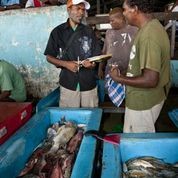
For Immediate Release
BANGKOK, January 29, 2014 – Fishing communities and vendors in the Solomon Islands are using mobile phone technology to develop a real-time database to manage their fish stocks as part of a project recently named one of the Grand Prize winners in the U.S. Agency for International Development (USAID) Science and Technology Pioneers Prize contest.
The Pioneers Prize, offered for the first time this year by USAID’s Office of Science and Technology, recognizes the best USAID projects and activities that successfully apply science and technology to solving development challenges.
The USAID-funded Hapi Fis, Hapi Pipol! (Happy Fish, Happy People!) mobile app helps government officials capture information from fishers and fish vendors about the island nation’s major fish markets and landing stations. Using software and surveys designed to gather data on inshore fisheries, the mobile application enables surveyors working under the Solomon Islands Ministry of Fisheries and Marine Resources to transmit collected information to a cloud-based virtual server. The computer system automatically combines and analyzes information to help the Solomon Islands government share information with the fishing industry and help manage and protect the country’s vital fisheries resources.
"This innovative mobile application shows how technology can dramatically improve how governments collect and make informed decisions based on information from their citizens -- even those in remote locations,” said Michael Yates, Director of USAID’s Regional Development Mission for Asia. “By more widely and systematically collecting real-time fisheries information, the Solomons Island government will be able to make more robust and evidence-based decisions that will help fishing communities and traders get the best prices for their fish and help the country strengthen its food security."
Without precise and centralized data, fisheries management at a meaningful scale had previously proved exceptionally difficult in a geographically dispersed island country. Paper entries were sometimes wet and illegible and data were not entered into a consolidated database to support management decisions.
The program, which is one of the first complete online platforms for inshore fisheries of its kind in the world, is part of the U.S. support to the six-nation Coral Triangle Initiative on Coral Reefs, Fisheries and Food Security. According to USAID Coral Triangle Support Partnership program manager Rene Acosta, the project evolved from a Solomon Islands’ call for help to safeguard their inshore fisheries. The Ministry of Fisheries and Marine Resources expressed interest in learning whether existing mobile phone data gathering applications could be adapted for inshore fisheries.
The project began in earnest in October 2012. “For resource management programs, and to support fishing communities, we need accurate data on production, species, origin, and how, when and by whom the fish are being caught. Now we have all this information literally at our fingertips,” said Solomon Island Government chief fisheries officer Ben Buga.
The project contracted the non-governmental organization Ecotrust, and its for-profit subsidiary Point 97 (pointnineseven.com), to custom design the software for Solomon Islands conditions where technological infrastructure is basic and fishers use 28 main fish landing ports and hundreds of smaller landing sites and markets across 1,000 islands.
“The Solomons was an ideal site to test this technology. They have all the logistical challenges,” said Acosta. “We knew that if we could make it work in the Solomons, we could make it work anywhere.”
The application architecture of the Solomon Islands mobile platform is based on open software and is available for adaptation in other countries.







Comment
Make a general inquiry or suggest an improvement.